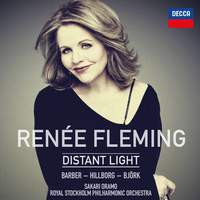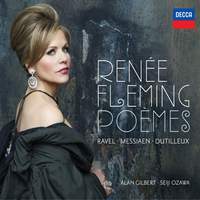Interview,
Renée Fleming on Distant Light
 The glorious American soprano Renée Fleming (currently taking London by storm in one of her signature roles, the Marschallin in Der Rosenkavalier) needs little introduction, but I thought that perhaps a bit of context for her eclectic new recording (released last Friday on Decca) might be appreciated: Distant Light juxtaposes a luminous new song-cycle by the Swedish composer Anders Hillborg with Barber's evocative Knoxville: Summer of 1915 and orchestrations of three songs by the idiosyncratic Icelandic diva Björk, and has completely bewitched the Presto office this week (even those who were initially sceptical about the crossover element on paper!).
The glorious American soprano Renée Fleming (currently taking London by storm in one of her signature roles, the Marschallin in Der Rosenkavalier) needs little introduction, but I thought that perhaps a bit of context for her eclectic new recording (released last Friday on Decca) might be appreciated: Distant Light juxtaposes a luminous new song-cycle by the Swedish composer Anders Hillborg with Barber's evocative Knoxville: Summer of 1915 and orchestrations of three songs by the idiosyncratic Icelandic diva Björk, and has completely bewitched the Presto office this week (even those who were initially sceptical about the crossover element on paper!).
I spoke to Renée on Monday (in between her appearances on BBC Breakfast and Radio 3's In Tune!) to find out more about the genesis of the Hillborg commission, her mission to expand the concert-repertoire for voice and orchestra, and her passion for contemporary Scandinavian music.
Can I ask you a little about the Hillborg commission - how that came about, how much input you had into the genesis of the piece, the selection of the texts?
I was in a restaurant after a concert in Stockholm with Alan Gilbert, and we got talking about the wonderful music of Anders Hillborg, who’s Swedish; I loved his work, and it was really Alan’s idea to commission something that we could premiere with the New York Philharmonic at Carnegie Hall. Once I was working with Anders, I said to him from the beginning: "Listen, the text is very important to me, so can we please agree together on a text? Because if I’m going to invest this much time on learning something new I want to make sure it’s something I love". And I recommended [the American poet] Mark Strand, who was still alive at that point: I'm a huge fan of Mark’s work, and we so much enjoyed talking together about what poetry would be terrific for this piece. I know Anders considered other poets as well, but he settled on Mark as such a musical version of what’s possible with texts. I wanted something immediately accessible to the audience: sometimes poetry can be so dense that you have to go away and think about it, so I wanted to make sure this was something they could get something from on the first hearing. I was so thrilled that we could record it, because I find Anders’s language is very modern and yet accessible. I always say it’s like a soundscape - you hear the landscape and the juxtaposition between most of the piece and The Sickness of Angels [the third section of the cycle], which I think is really exciting.
And how do you feel that Barber's Knoxville fits into the picture? It seems slightly like the odd one out with it not being a Scandinavian work – did it come about because it shares some of the nocturnal atmosphere of the Hillborg?
Well, I have to tell you honestly, it came about because I had never recorded it! It was Decca’s idea, and to record two major works for soprano and orchestra was wonderful for me, because that’s mostly what I do: I spend about 80% of my time singing concerts (mostly orchestral ones, with a few piano recitals), and I’m really focused on building a repertoire – I’ve just premiered a 30-minute piece for soprano and orchestra, composed by Kevin Puts and based on letters of Georgia O’Keeffe (Letters from Georgia). So if that’s all I do from now on I’ll be very happy indeed, because I’ve spent so much time singing Four Last Songs and Shéhérazade!
You included Henri Dutilleux’s Le Temps l’horloge, another work written for you, on your last recital-disc with orchestra back in 2012: do you see any parallels between that work and The Strand Settings, in terms of the way they showcase the special qualities of your voice?
You can’t really compare them other than to say that what they have in common is that I can sing them! They’re a good fit for me, but other than that they’re incredibly different – the Dutilleux sits lower (there’s something so rich about the harmonies!), whereas Anders was fascinated with the opposite: he wanted me to sing higher all the time. In the beginning I said "Let’s try to amplify this, let’s find a sort of real intimacy in the work", and it’s been kind of fun to play with that in the recording.
And it seems to flow very naturally into the three Björk arrangements as well...What is it about her that speaks to you as a fellow singer?
She’s somebody who’s always fascinated me with her courage, her artistry: I’ll never forget when she came out in a swan costume! She really has an artist’s heart in the way her videos complemented her work but never copied it, were never cookie-cutter; and then the songs themselves are all very interesting, incredibly well-arranged and fascinating. And she’s a soprano! She has a very enigmatic vocal style – I started off trying to copy her but I knew immediately that would be a terrible choice, so I just decided to sing them with my voice, and allow people’s tastes to lead them.
I remember reading in your autobiography (The Inner Voice: The Making of a Singer) that you worked as a jazz singer when you were a student. Is that something you ever draw on when you’re working on new music?
I did two and a half years of singing in clubs while I was getting my graduate degree, which very much informed my classical singing – more so in the beginning, because I sort of applied the same freedom. I wanted to be interpretatively a little more free, and it’s funny because I was heavily criticised for doing that at the beginning of my career – so I stopped doing it and started singing everything like it was Mozart! And recently a couple of people stopped me and said “Why did you stop? It’s the thing that made you unique and different from other singers!"; and I went back and listened and I thought "You know, you’re right: I should have continued on with my own kind of ideas about how I wanted to interpret things”. But I suppose it’s just one of those things, not a huge regret!
Is Scandinavian repertoire a relatively new departure for you, or is it a long-standing passion which just hasn’t made it onto disc before?
I feel that this school of composition - certainly the Finnish school (people like Esa-Pekka Salonen, Kaija Saariaho) is incredibly fertile and exciting at the moment. Next week we have the PBS premiere of Jimmy Lopéz’s Bel Canto, which is the opera I curated at [Chicago] Lyric Opera - he was trained in Helsinki, even though he’s Peruvian. I would say it’s the finest school in composition right now, so if you like new music I think you’ll definitely enjoy exploring the Scandinavian composers.
Distant Light was released on Decca on 6th January.
Available Formats: MP3, FLAC, Hi-Res FLAC
Released in 2012 and featuring the Orchestre Philharmonique de Radio France under Alan Gilbert, Poèmes includes the world premiere recording of Dutilleux's Le Temps l’horloge alongside song-cycles by Ravel and Messiaen.
Available Formats: MP3, FLAC




